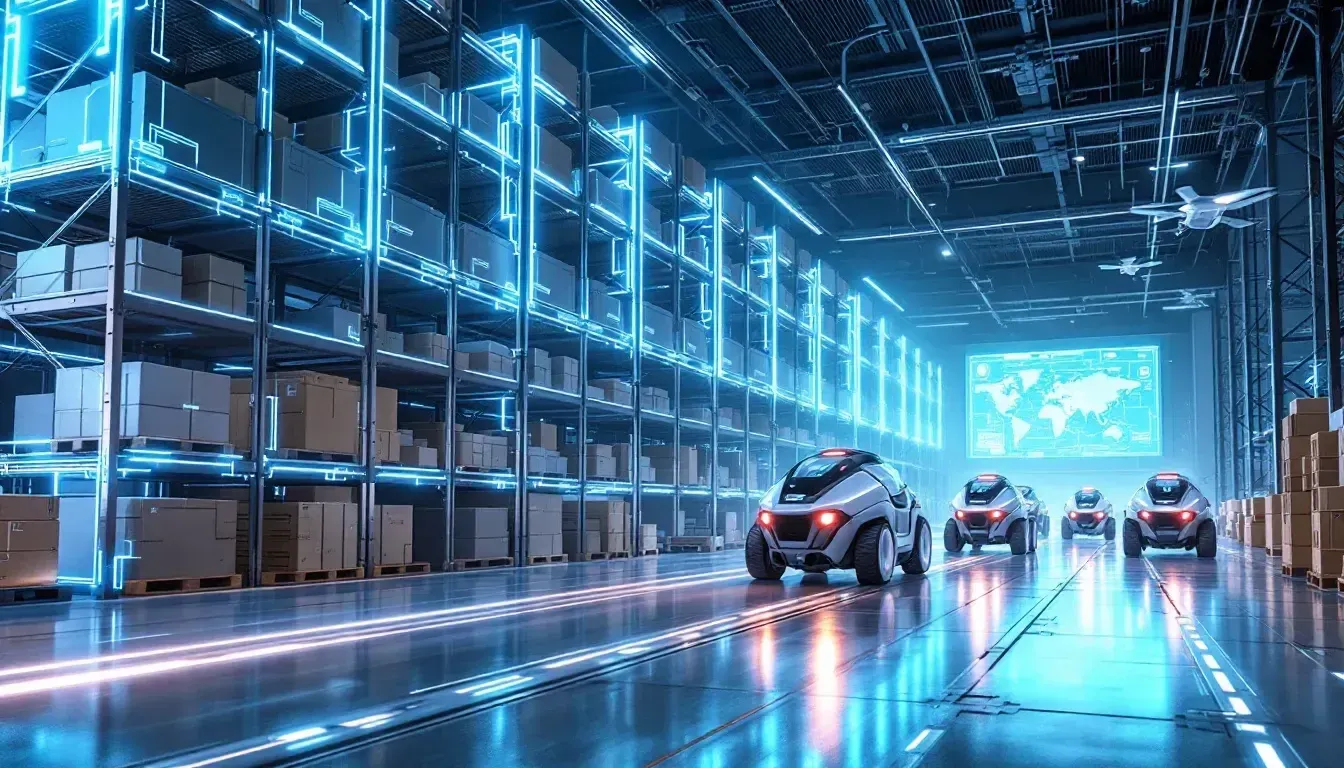AI in Logistics: Top 10 Breakthroughs Improving Supply Chain Efficiency
AI is transforming logistics by making operations more efficient and cost-effective. From optimizing delivery routes to predicting maintenance needs, AI is reshaping logistics processes. This article delves into 10 key breakthroughs where AI is making a significant impact in logistics.
Key Takeaways
- AI is transforming logistics by enhancing decision-making, optimizing processes, and reducing logistics costs by up to 20%.
- Key applications of AI in logistics include dynamic route optimization, predictive maintenance, and accurate demand forecasting to improve operational efficiency and customer satisfaction.
- Sustainable practices are being promoted through AI technologies, such as optimized route planning and energy consumption regulation in warehouses, leading to reduced environmental impact.
Revolutionizing Logistics Operations with AI

Artificial Intelligence is transforming logistics operations, processing vast data to enhance decision-making and optimize processes. AI’s ability to analyze and interpret data leads to smarter, faster, and more efficient logistics operations. This technological advancement is not just about incremental improvements; it’s about transformative changes that reshape the logistics landscape. Logistics companies can now manage order processing, inventory management, and distribution systems with unprecedented efficiency, resulting in reduced logistics costs by up to 20%.
Advancements in AI technologies are poised to drive unparalleled efficiency and innovation in logistics by 2025. These technologies enable logistics companies to stay competitive by offering substantial operational improvements and cost reductions. Integrating AI into logistics processes signifies a shift towards a more data-driven approach, where decisions are backed by predictive analytics and real-time insights.
Beyond operational efficiency, AI significantly reduces logistics costs, providing a competitive edge in the industry. By implementing AI, logistics service providers can enhance their operational effectiveness, leading to a more resilient supply chain and better customer service.
Enhancing Supply Chain Management
AI accelerates data analysis and processes large amounts of data for forecasting, significantly enhancing decision-making in supply chain management. Accurate demand forecasting, facilitated by AI, optimizes inventory levels, improves supply chain planning, and minimizes stockouts and waste. This reduction in inefficiencies enhances operational efficiency and leads to reduced logistics costs. AI’s ability to handle complex data sets and make precise predictions is a game-changer for logistics companies.
Moreover, AI enhances supplier risk profiling by evaluating performance metrics and financial health, aiding logistics managers in making informed decisions regarding supplier selection. This capability ensures a resilient supply chain, reducing the risks associated with supplier reliability and performance.
AI enables logistics companies to offer more customized services, boosting customer satisfaction and service quality.
Dynamic Route Optimization
Dynamic route optimization, driven by AI’s ability to process real-time traffic data, determines the most efficient routes. For instance, Amazon uses AI to optimize delivery routes based on real-time factors, which helps minimize delivery times and costs. This not only enhances customer satisfaction but also improves operational efficiency by reducing fuel consumption and travel time.
Companies like DHL use AI-powered route planning software to ensure efficient delivery sequences. These systems consider various factors, including traffic conditions, GPS data, and weather forecasts, to find the best delivery routes. By analyzing large volumes of data, AI helps logistics managers select the most efficient route, thereby reducing fuel costs and improving delivery times.
AI’s route optimization also accounts for unexpected factors like road closures, accidents, and congestion. This flexibility allows logistics operations to achieve documented efficiency gains of up to 30%. By continuously learning and adapting to new data, AI ensures that logistics companies can maintain high levels of efficiency and customer satisfaction.
Predictive Maintenance for Reduced Downtime
Predictive maintenance, another area where AI excels, involves predicting equipment issues through data analysis to minimize downtime. In logistics, predictive maintenance analyzes real-time data from IoT sensors to forecast machine failures and ensure timely interventions. This approach reduces unscheduled maintenance costs and enhances overall logistical performance.
Companies like Paccar utilize machine learning for predictive maintenance to forecast truck repairs, ensuring a seamless logistics operation. By analyzing indicators such as changes in temperature and vibration, AI can determine when maintenance may be required, thus preventing breakdowns and reducing operational costs.
This capability is crucial for maintaining a resilient supply chain and ensuring that logistics industry processes run smoothly.
Improving Inventory Management with AI Technologies

AI technologies revolutionize inventory management by ensuring optimal stock levels and minimizing waste. By analyzing data, AI can reduce inventory levels by 35%, optimizing resource use and enhancing profit margins. This capability is particularly useful in anticipating market demands and improving supply chain efficiency. AI also predicts future production and transportation volumes, allowing logistics managers to allocate resources more effectively.
AI can reduce supply chain errors by 20 to 50% through effective forecasting. Automating processes like counting, data entry, and reordering, AI streamlines inventory management. Computer vision further supports efficient management by ensuring increased accuracy in tracking inventory. These advancements make AI an indispensable tool for modern logistics.
Accurate Demand Forecasting
Accurate demand forecasting is crucial for optimizing inventory levels and improving customer satisfaction. AI uses predictive analytics, historical data, and market trends to enhance demand forecasting accuracy. For example, Amazon leverages AI to analyze historical sales data, product images, and customer reviews, thus improving demand forecasting and significantly reducing surplus inventory and stock-outs.
AI-driven demand forecasting allows logistics companies to achieve significant cost savings and be well-prepared for future demand. This capability is vital for maintaining a resilient supply chain and ensuring that customers receive their products on time.
Real-Time Inventory Tracking
AI enhances inventory tracking by providing continuous monitoring throughout the supply chain, allowing businesses to maintain accurate inventory levels and respond promptly to demand fluctuations. Advanced technologies such as RFID and IoT sensors facilitate real-time visibility of inventory movements, improving accuracy and reducing the likelihood of stock discrepancies. AI-driven systems automate the data collection process during inventory tracking, reducing manual input and minimizing errors associated with traditional tracking methods.
AI integrates data from various sources to offer a unified view of inventory, enabling better decision-making regarding stock replenishment and resource allocation. By analyzing historical data and current trends, AI can also predict potential stock shortages, allowing companies to take proactive measures to address inventory challenges.
Automating Warehouse Processes with AI-Powered Robots

AI-powered robots transform warehouse operations by optimizing tedious activities and reducing errors, leading to lower operational costs. Robots streamline workflows by automating tasks like data entry and order fulfillment, ensuring better coordination with other automated systems. Honeywell’s AI-powered robotic system, for instance, is designed for order picking and sorting, significantly improving productivity in warehouse settings.
The projection that over 60% of warehouses will adopt AI-powered robotic solutions by 2026 highlights the significant shift towards logistics automation. These advancements aim to replace manual labour and enhance the overall efficiency and accuracy of warehouse operations.
AI-Powered Sorting Systems
Automated sorting systems powered by AI can significantly reduce operational time by efficiently categorizing items based on real-time data. These systems optimize item placement and picking routes to minimize travel time, ensuring that warehouse operations run smoothly and efficiently.
AI-powered sorting systems exemplify how AI technologies can enhance logistics processes and improve supply chain efficiency.
Visual Inspection and Quality Control
AI enhances visual inspection and quality control by using machine learning and computer vision to identify and classify damages. These technologies can determine the size and type of damage and take appropriate action, automating quality control processes.
Implementing computer vision for product inspection allows for quicker identification of defects, improving the reliability of quality assurance processes. This capability is essential for maintaining high levels of customer satisfaction and ensuring that products meet quality standards.
Enhancing Customer Service through AI Solutions

AI enhances customer service in logistics by providing immediate responses to inquiries and automating routine interactions. AI-driven chatbots respond to customer queries 24/7, enhancing overall service efficiency. These chatbots can handle common queries about shipment status and delivery timelines, significantly reducing wait times and freeing up human agents for more complex issues.
AI also streamlines operations by automating routine tasks and providing real-time tracking, significantly enhancing the customer experience. In e-commerce logistics, AI reduces costs, improves efficiency, and enhances customer service. Real-time tracking and monitoring of parcels are crucial for customer satisfaction, as it allows customers to stay informed about the status of their shipments.
AI Chatbots for Customer Inquiries
Companies are increasingly deploying AI-driven chatbots to manage common logistical queries efficiently and provide timely information to customers. These chatbots can handle queries about shipment status, delivery timelines, and other common concerns, significantly reducing wait times. AI chatbots in logistics can operate continuously, providing support outside regular business hours and enhancing overall customer service.
AI-driven chatbots enhance customer service by improving shipment tracking and inquiries, ensuring customers receive accurate and timely information. Deploying AI chatbots not only frees up human agents for more complex issues but also improves overall customer response times.
Personalized Customer Experience
Before: Machine learning personalizes customer interactions by analyzing preferences and purchasing history for tailored recommendations. The use of machine learning algorithms enables personalized customer experiences by predicting individual preferences based on previous interactions. AI technologies enhance the personalized customer experience by tailoring interactions based on individual customer profiles, leading to increased customer satisfaction.
After: Machine learning personalizes customer interactions by:
- Analyzing preferences and purchasing history for tailored recommendations
- Predicting individual preferences based on previous interactions
- Tailoring interactions based on individual customer profiles
This leads to increased customer satisfaction.
Personalizing customer experiences with AI improves customer satisfaction and fosters better customer relationships. By understanding and anticipating customer needs, logistics companies can offer more relevant and efficient services, enhancing the overall customer experience.
Reducing Operational Costs with AI Adoption
Artificial intelligence has the potential to reduce operational costs in logistics by up to 50%. Using AI in e-commerce logistics can reduce downtime, improve delivery times, and increase inventory accuracy. AI provides insights for optimizing truck numbers and stock levels, enhancing resource management, and leading to significant cost savings. These efficiencies are crucial for logistics companies looking to stay competitive in a rapidly evolving market.
Additionally, 44% of executives reported cost reductions after adopting AI in their logistics operations. Administering AI in logistics can lead to a decrease in administration costs ranging from 25% to 40%.
AI route optimization enhances delivery efficiency, providing faster deliveries and reducing fuel costs. This comprehensive approach to cost reduction is essential for maintaining a resilient supply chain and improving overall operational efficiency.
Streamlined Document Processing
AI automates document processing in logistics, streamlining paperwork handling and reducing time spent on manual data entry. Utilizing AI, particularly Optical Character Recognition (OCR) and Natural Language Processing (NLP) technologies, allows for the efficient reading and extraction of information from documents. This automation enhances operational efficiency and reduces the likelihood of human error in document processing.
AI also automates error reconciliation, further enhancing document accuracy in logistics. Integrating AI into document processing helps logistics companies achieve significant cost savings and improve overall efficiency, leading to a more streamlined and effective supply chain.
Dynamic Pricing Strategies
AI dynamically adjusts pricing based on competitor strategies to maximize profit. Through timely pricing adjustments, AI performs real-time market analysis, enhancing customer satisfaction. Dynamic pricing strategies allow logistics companies to stay competitive by more effectively responding to market changes and demand fluctuations.
By using AI for dynamic pricing, logistics companies can optimize their pricing strategies to align with market trends and customer expectations. This capability not only improves profit margins but also ensures that customers receive fair and competitive pricing, enhancing overall customer satisfaction.
Real-Time Shipment Tracking and Transparency
AI systems autonomously monitor shipment status in real-time, alerting managers to potential issues and enabling quick resolution of delays. AI-powered tracking systems offer real-time visibility of shipments, enhancing logistics operations and ensuring that customers are kept informed about the status of their deliveries. This transparency is crucial for maintaining customer satisfaction and trust.
FedEx uses predictive analytics to anticipate shipment delays and proactively manage logistics disruptions. AI analytics elevate customer satisfaction by predicting delivery issues and streamlining fulfillment processes. By providing real-time shipment updates directly to customers, AI-driven systems improve logistics communication and ensure a seamless delivery experience.
Proactive Issue Resolution
FedEx’s AI system tracks shipments every two seconds, allowing for timely monitoring and proactive issue resolution. AI systems send alerts for delivery delays and stock shortages, enabling logistics managers to address issues proactively and ensure that shipments are delivered on time. This capability is essential for maintaining a resilient supply chain and ensuring customer satisfaction.
AI enhances proactive problem-solving by allowing logistics managers to intervene in supply chain issues before they escalate. By leveraging AI for proactive issue resolution, logistics companies can improve operational efficiency and reduce the impact of potential disruptions on their supply chains.
Enhanced Supply Chain Visibility
AI tools offer end-to-end visibility, addressing the significant gap experienced by 44% of supply chain executives who lack such insights. Integrating data from various sources, AI tools facilitate comprehensive tracking of supply chain processes, enhancing transparency and coordination. This visibility is crucial for maintaining an efficient and resilient supply chain.
AI tools allow for comprehensive tracking of supply chain processes, thereby enhancing operational transparency. By providing a unified view of the supply chain, AI enables logistics managers to make informed decisions and ensure that all aspects of the supply chain are running smoothly.
AI-Driven Risk Management in Logistics
AI mitigates risks within logistics operations, enhancing decision-making and operational efficiency. AI systems analyze shipment data to predict potential delays, allowing logistics managers to intervene before issues escalate. Using predictive analytics and machine learning, AI enhances risk management in supplier interactions, ensuring a resilient supply chain.
Integrating AI in risk management improves operational resilience and builds trust among stakeholders. AI predicts potential delivery delays and assesses supplier reliability, helping logistics companies mitigate risks and ensure smooth operations.
Fraud Detection and Prevention
AI algorithms enhance security in logistics by quickly flagging suspicious activities and monitoring transactions in real time. By analyzing client transactional data, AI flags suspicious behaviours that indicate financial irregularities, strengthening security measures. UPS utilizes its DeliveryDefense system, which assigns a delivery confidence score by analyzing historical data and various factors, enhancing fraud detection capabilities.
Using historical data, AI detects anomalies suggesting fraudulent behaviour, preventing security breaches before they escalate. Continuously monitoring data, AI enhances fraud detection and ensures logistics operations remain secure.
Supplier Risk Profiling
Automated Vendor Interface Systems aim to mitigate risks associated with supply chain processes by utilizing machine learning. Supplier risk evaluation is crucial for effective supply chain management, ensuring that logistics companies can rely on their suppliers for consistent performance and reliability.
Implementing automated systems leads to improved supplier performance and reliability, contributing to a more resilient supply chain. By leveraging AI for supplier risk profiling, logistics companies can make informed decisions and reduce the risks associated with supplier interactions.
Leveraging AI for Sustainable Logistics Practices

Artificial intelligence plays a crucial role in promoting sustainability in logistics by optimizing processes and reducing energy consumption. By analyzing data to improve route planning, AI can significantly enhance logistics' eco-friendliness, leading to reduced emissions and fuel consumption. These capabilities are essential for logistics companies looking to reduce their environmental impact and promote sustainable practices.
AI enhances the sustainability of logistics by optimizing resource utilization, reducing emissions, and promoting eco-friendly practices. By implementing AI for sustainable logistics practices, logistics companies can achieve operational efficiency while contributing to environmental conservation.
Optimized Transportation Routes
Optimized transportation routes are essential to enhancing logistics efficiency and minimizing operational costs. AI systems analyze real-time traffic data to identify the most efficient routes, improving delivery schedules and resource allocation. By selecting optimal routes, AI helps minimize fuel consumption, ultimately leading to significant cost savings and lower carbon emissions.
Dynamic route optimization through AI significantly enhances logistics operations, contributing to more sustainable and efficient supply chains. By leveraging AI for route optimization, logistics companies can achieve both operational efficiency and sustainability goals.
Energy Consumption Regulation in Warehouses
AI uses IoT sensors and machine learning to optimize energy use in real-time, promoting sustainability and reducing operational costs in warehouses. Energy consumption regulation is vital for warehouses to enhance sustainability efforts and transform operations into more efficient systems. By optimizing energy consumption, AI helps significantly cut operational costs associated with energy use.
Integrating AI for energy management enhances sustainability efforts and transforms warehouse operations into more efficient systems. This capability is crucial for logistics companies seeking to reduce their environmental impact and promote sustainable practices.
Overcoming Challenges in AI Implementation
Addressing challenges in AI implementation is essential to fully realizing the potential benefits of AI technology in logistics operations. Logistics firms face significant challenges in AI implementation, including data accessibility, high costs, and talent acquisition. Communicating the benefits of AI and providing staff training can mitigate resistance and facilitate proper integration. By investing in training for existing staff or hiring external experts, logistics companies can close skill gaps and ensure successful AI implementation.
A coherent data strategy framework combined with a clear action plan is essential for successfully implementing AI. By addressing data quality issues and investing in training, logistics companies can overcome challenges and harness the full potential of AI technologies.
Integration with Existing Systems
Established logistics companies face complexities and time constraints when integrating AI solutions with their legacy systems. Legacy systems often present challenges for AI integration due to their outdated architecture, limited compatibility, and lack of flexibility. Firms often underestimate the extent of the changes needed to integrate AI with their existing infrastructure.
Modular integration or transitioning to cloud platforms is a proposed solution to tackle issues with legacy systems. Firms need expertise to map out AI functionalities successfully for better integration with current tools. It is recommended that AI implementation start with cost-efficient technologies such as cloud-based platforms. High-impact AI projects can showcase added value before scaling up integration efforts.
Addressing Data Quality Issues
High-quality data is critical for the successful implementation of AI, as it directly impacts the performance of AI models. Poor data quality can lead to misleading outcomes, making data quality management essential for AI applications. Data quality management should include measures such as cleaning, validating, and standardizing data.
Customized ETL (Extract, Transform, Load) pipelines can be implemented to address data quality challenges in AI logistics applications. Advanced ETL pipelines efficiently clean and integrate data for AI applications, ensuring that logistics companies can rely on accurate and high-quality data for their AI-driven processes.
Case Studies: Leading Companies Using AI in Logistics
AI technologies are transforming logistics by improving automation and efficiency across various operations. Leading companies like Amazon and FedEx are at the forefront of this transformation, leveraging AI to improve their logistics processes and overall supply chain efficiency.
By examining these case studies, we can gain valuable insights into how AI is being implemented in real-world scenarios and the tangible benefits it offers to logistics companies. From automated warehousing to predictive analytics, these examples demonstrate the power of AI in revolutionizing logistics operations.
Amazon's Automated Warehousing
Amazon employs AI and robotics to manage inventory in warehouses, significantly reducing human intervention and enhancing operational efficiency. The robots in Amazon’s warehouses handle tasks such as picking, sorting, and transporting goods, ensuring that operations run smoothly and efficiently. Amazon has deployed over 200,000 robots in its warehouses, highlighting the significant impact of AI-powered logistics on their operations.
By leveraging AI and robotics, Amazon can optimize its warehousing processes, reduce labour costs, and improve overall supply chain efficiency. This case study exemplifies the transformative power of AI in modern logistics.
FedEx's Predictive Analytics
FedEx leverages AI for predictive analytics, which plays a crucial role in refining its service capabilities and operational efficiencies. By utilizing historical delivery data, FedEx’s predictive analytics capabilities allow for better decision-making in logistical operations. AI systems analyze real-time data, including traffic and weather conditions, to determine the best delivery routes, ensuring timely deliveries and reducing costs.
Optimized delivery routes enhance customer satisfaction and contribute to significant cost savings for FedEx. This case study demonstrates how AI-driven predictive analytics can transform logistics operations and improve overall supply chain efficiency.
Summary
Artificial intelligence is revolutionizing the logistics industry by enhancing supply chain efficiency, reducing operational costs, and improving customer satisfaction. From dynamic route optimization and predictive maintenance to real-time shipment tracking and personalized customer experiences, AI’s capabilities are vast and varied. By leveraging AI technologies, logistics companies can achieve unprecedented levels of efficiency and innovation, ensuring that they stay competitive in a rapidly evolving market.
As we look to the future, AI will continue to play a crucial role in shaping the logistics landscape. By addressing the challenges of AI implementation and continuously advancing AI technologies, logistics companies can harness AI's full potential to drive operational excellence and sustainable practices. The journey towards a more efficient and resilient supply chain is well underway, and AI is at the forefront of this transformation.
Frequently Asked Questions
How does AI improve supply chain management?
AI improves supply chain management by enabling accurate demand forecasting, optimizing inventory levels, and enhancing supplier risk profiling, which ultimately leads to better decision-making and reduced logistics costs.
What is dynamic route optimization, and how does it benefit logistics?
Dynamic route optimization leverages AI to evaluate real-time traffic and other factors, enabling logistics companies to select the most efficient routes. This approach significantly reduces delivery times and fuel costs while improving overall customer satisfaction.
How does predictive maintenance reduce downtime in logistics?
Predictive maintenance significantly reduces downtime in logistics by utilizing AI to analyze real-time data and anticipate machine failures. This proactive approach allows for timely interventions and minimizes unscheduled maintenance, ultimately enhancing overall logistical performance.
How do AI-powered robots enhance warehouse operations?
AI-powered robots significantly enhance warehouse operations by automating tasks such as order fulfillment and sorting. This technological integration reduces errors and operational costs while boosting overall productivity. It also improves coordination with other automated systems, creating a more efficient workflow.
What are the challenges of implementing AI in logistics, and how can they be overcome?
Implementing AI in logistics can be challenging, as can data accessibility, high costs, and talent acquisition. However, these can be overcome by communicating the benefits of AI, training staff, enhancing data quality, and using modular integration or cloud solutions.
Share

Maxim Atanassov, CPA-CA
Serial entrepreneur, tech founder, investor with a passion to support founders who are hell-bent on defining the future!
I love business. I love building companies. I co-founded my first company in my 3rd year of university. I have failed and I have succeeded. And it is that collection of lived experiences that helps me navigate the scale up journey.
I have found 6 companies to date that are scaling rapidly. I also run a Venture Studio, a Business Transformation Consultancy and a Family Office.
